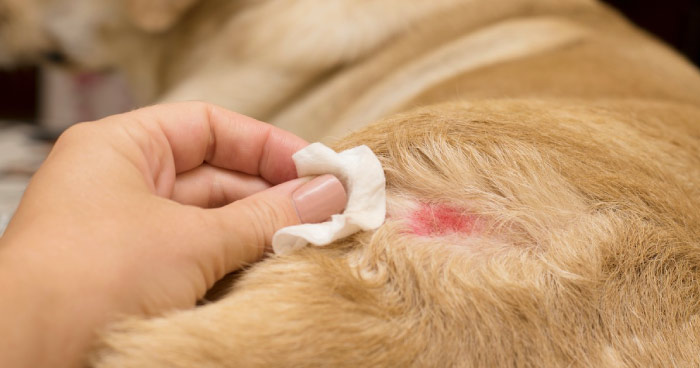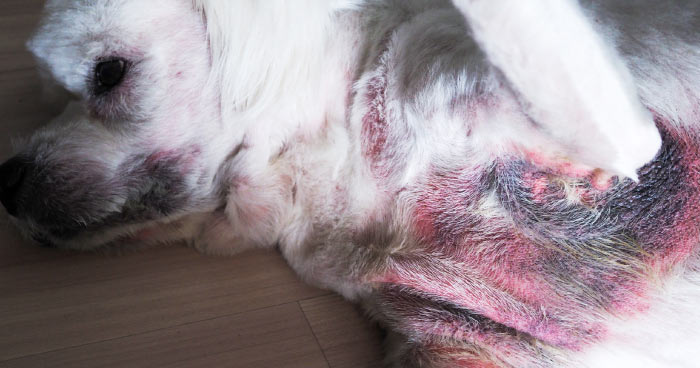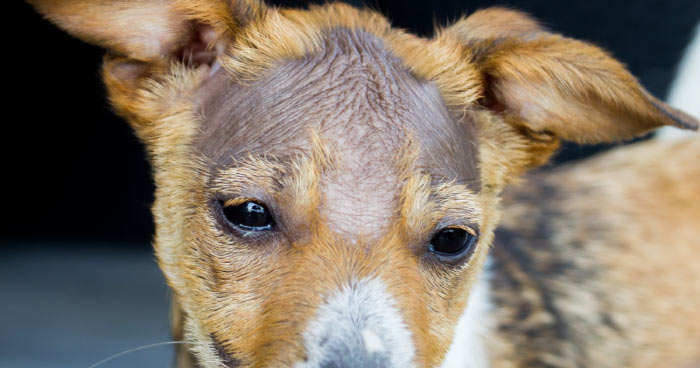
15 Feb
Most Commonly Occurring Skin Conditions in Dogs
Have you ever been woken up in the middle of the night by the sound of your dog licking their paws? As it turns out, there might be a very good reason for that. The sound of incessant licking and the reasons behind it may make you believe your pet is at fault, but that is not the case.
Your pet is merely trying to soothe their itchy skin, which means the real culprit is the root of the problem: skin conditions. Skin problems aren’t just an issue at home either; if you’re looking to embark on pet travel, you’ll need to make sure your pet Is healthy and free of any conditions. We’ve outlined the most common skin conditions in dogs, so you can help soothe your dog and stop them from trying to lick the itch away.
Allergic Dermatitis

Dermatitis is a skin condition that is caused by allergens present in your pet’s environment and diet. Allergic dermatitis can cause ear infections, skin infections, and itching across the body. Environmental allergens cause hypersensitivity, which occurs when airborne substances like pollen, dust, mould spores, and soil enter your dog’s body and fur.
To get rid of the itch, dogs will scratch, gnaw, lick, or rub the afflicted areas of their bodies, which are usually their faces, paws, backs, and posteriors. To prevent environmental allergies, make sure your pet stays neat and has a clean environment, and try to pinpoint the exact allergens in and around your environment so you can minimize their impact.
Food allergens are foods and substances that your pet’s immune system mistakes for an infection or threat. When their immune system gets defensive, they develop a reaction to their meal which is known as a food-based allergy. To solve this issue, consult your vet and get an allergy test conducted on your pet, as this will help you identify the allergen, and you can then substitute it with other foods or supplements.
Ringworm

While the name will lead you to believe that it is caused by a worm, ringworm is caused by a fungus, which is known as dermatophytosis. Ringworm is an infectious condition, meaning it can spread from direct contact with another animal suffering from ringworm, or through airborne spores present in the environment.
The good news is you can prevent your dog from contracting ringworm by making sure its skin is healthy. Ringworm cannot affect healthy skin, and it is usually contracted when there is scraped, scratched, or shaved skin on your dog. The fungus cannot infect healthy skin, so you should be good to go provided your dog isn’t carrying any recent scabs or scrapes.
Yeast Infections

When we say bacteria or fungi, people often assume it to be a disease-causing pathogen; however, bacteria are of both good and bad types. Your dog’s skin contains many different types of microbes like bacteria and fungi, which are normally kept in check by their immune system. However, when the naturally occurring yeast grows excessively, it leads to irritated skin. The good news is that yeast infections are not contagious, and you can treat them at home using an antifungal shampoo and regular brushing. Consult your vet for an appropriate shampoo for your dog.
Ectoparasitic Infections

Ectoparasitic attacks refer to parasitic attacks on your dog’s skin. Ectoparasites are parasitic organisms that dwell on your pet’s skin, which is where they get their food from. When these parasites feed and reproduce, they can cause dangerous blood-borne diseases which can prove to be seriously harmful to your pet’s health. Ticks, fleas, lice, parasitic flies and mites are all bloodsucking parasites that can cause skin and blood infections, so it is best to keep an eye out for them. Regular grooming, especially before and after outdoor walks through areas where these parasites live, can help eliminate their presence. If you notice an infestation, be sure to consult your vet for an appropriate solution, as these diseases should not be taken lightly. Parasite treatment is also required before international pet travel, so check your destination country’s requirements and ensure your pet is free of internal and external parasites.
Alopecia

Otherwise known as hair loss, alopecia refers to thinning hair or bald spots, often accompanied by itching and swollen skin in the surrounding area. Ectoparasites, skin infections, ringworms, and dermatitis can all cause bald spots that alopecia is synonymous with. The best way to prevent it is to ensure you spot any symptoms of an underlying issue promptly and work on treating it so that it won't cause any long-term damage to your pet's health and skin.
To conclude, skin conditions in dogs are not abnormal, especially when you consider the plethora of surfaces our pets love to roll around in. provided, you’re mindful about the symptoms, get regular check-ups with the vet, and administer preventive treatment for any pesky infections, you should have no trouble mitigating or eliminating the presence of skin conditions in your dog.






AUTHOR’S BIO
Carry My Pet
Passionate pet enthusiasts and globetrotters, dedicated to easing furry friends' journeys worldwide. Penning tales of compassion at CarryMyPet, where every relocation is a tail-wagging adventure.